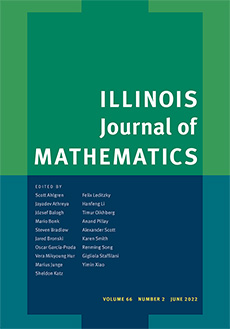Abstract
Let $f_0, f_1, \dots, f_k$ be $n$--variable polynomials over a finite prime field $\fp$. A proof of the ideal membership $f_0 \in \langle f_1, \dots, f_k \rangle$ in {\em polynomial calculus} is a sequence of polynomials $h_1, \dots, h_t$ such that $h_t = f_0$, and such that every $h_i$ is either an $f_j$, $j \geq 1$, or obtained from $h_1, \dots, h_{i-1}$ by one of the two inference rules: $g_1$ and $g_2$ entail any $\fp$--linear combination of $g_1$, $g_2$, and $g$ entails $g \cdot g'$, for any polynomial $g'$. The degree of the proof is the maximum degree of the $h_i$'s. We give a condition on families $\{ f_{N,0}, \dots, f_{N,k_N}\}_{N<\omega}$ of $n_N$--variable polynomials of bounded degree implying that the minimum degree of polynomial calculus proofs of $f_{N,0}$ from $f_{N,1}, \dots, f_{N,k_N}$ cannot be bounded by an independent constant and, in fact, is $\Omega(\log(\log(N)))$. In particular, we obtain an $\Omega(\log(\log(N)))$ lower bound for the degrees of proofs of $1$ (so called {\em refutations}) of the $(N,m)$--system (defined in \cite{BIKPP}) formalizing a modular counting principle (where $m$ is fixed and not divisible by $p$, and the parameter $N$ is not divisible by $m$), and a similar lower bound for refutations of systems encoding that $N$ is composite (whenever $N$ is a prime). No bounds were previously known for these systems. The same method yields $\Omega(\log(N))$ lower bounds for the degree of coefficient polynomials in Nullstellensatz proofs. The method is based on a new result about a uniform way of generating all submoduli of tabloid moduli.
Citation
Jan Krajíček. "On the degree of ideal membership proofs from uniform families of polynomials over a finite field." Illinois J. Math. 45 (1) 41 - 73, Spring 2001. https://doi.org/10.1215/ijm/1258138254
Information





